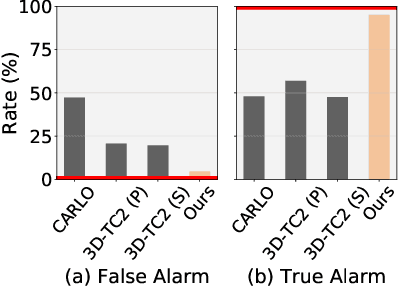ADoPT: LiDAR Spoofing Attack Detection Based on Point-Level Temporal Consistency
Paper and Code
Oct 23, 2023



Deep neural networks (DNNs) are increasingly integrated into LiDAR (Light Detection and Ranging)-based perception systems for autonomous vehicles (AVs), requiring robust performance under adversarial conditions. We aim to address the challenge of LiDAR spoofing attacks, where attackers inject fake objects into LiDAR data and fool AVs to misinterpret their environment and make erroneous decisions. However, current defense algorithms predominantly depend on perception outputs (i.e., bounding boxes) thus face limitations in detecting attackers given the bounding boxes are generated by imperfect perception models processing limited points, acquired based on the ego vehicle's viewpoint. To overcome these limitations, we propose a novel framework, named ADoPT (Anomaly Detection based on Point-level Temporal consistency), which quantitatively measures temporal consistency across consecutive frames and identifies abnormal objects based on the coherency of point clusters. In our evaluation using the nuScenes dataset, our algorithm effectively counters various LiDAR spoofing attacks, achieving a low (< 10%) false positive ratio (FPR) and high (> 85%) true positive ratio (TPR), outperforming existing state-of-the-art defense methods, CARLO and 3D-TC2. Furthermore, our evaluation demonstrates the promising potential for accurate attack detection across various road environments.
 Add to Chrome
Add to Chrome Add to Firefox
Add to Firefox Add to Edge
Add to Edge